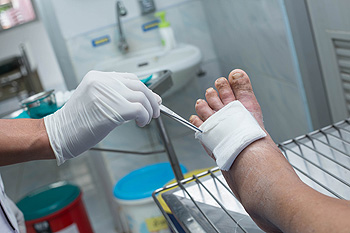 Foot wounds are serious conditions that can develop in diabetic patients. People who have diabetes may have difficulty in feeling if there are cuts on their feet, which can develop into foot ulcers. This type of wound requires prompt treatment, which includes cleaning the wound, followed by dressing it with a proper bandage. Diabetic patients may reduce their risk of getting cuts and bruises on their feet by wearing shoes that are comfortable. Additionally, it is beneficial to avoid walking barefoot, wear clean socks, and maintain control of blood glucose levels. If you have developed a wound on your foot, it is advised you confer with a podiatrist who can offer proper treatment options which may include prescribing antibiotics.
Foot wounds are serious conditions that can develop in diabetic patients. People who have diabetes may have difficulty in feeling if there are cuts on their feet, which can develop into foot ulcers. This type of wound requires prompt treatment, which includes cleaning the wound, followed by dressing it with a proper bandage. Diabetic patients may reduce their risk of getting cuts and bruises on their feet by wearing shoes that are comfortable. Additionally, it is beneficial to avoid walking barefoot, wear clean socks, and maintain control of blood glucose levels. If you have developed a wound on your foot, it is advised you confer with a podiatrist who can offer proper treatment options which may include prescribing antibiotics.
Wound care is an important part in dealing with diabetes. If you have diabetes and a foot wound or would like more information about wound care for diabetics, consult with one of our podiatrists from Active Foot and Ankle Care, LLC. Our doctors will assess your condition and provide you with quality foot and ankle treatment.
What Is Wound Care?
Wound care is the practice of taking proper care of a wound. This can range from the smallest to the largest of wounds. While everyone can benefit from proper wound care, it is much more important for diabetics. Diabetics often suffer from poor blood circulation which causes wounds to heal much slower than they would in a non-diabetic.
What Is the Importance of Wound Care?
While it may not seem apparent with small ulcers on the foot, for diabetics, any size ulcer can become infected. Diabetics often also suffer from neuropathy, or nerve loss. This means they might not even feel when they have an ulcer on their foot. If the wound becomes severely infected, amputation may be necessary. Therefore, it is of the upmost importance to properly care for any and all foot wounds.
How to Care for Wounds
The best way to care for foot wounds is to prevent them. For diabetics, this means daily inspections of the feet for any signs of abnormalities or ulcers. It is also recommended to see a podiatrist several times a year for a foot inspection. If you do have an ulcer, run the wound under water to clear dirt from the wound; then apply antibiotic ointment to the wound and cover with a bandage. Bandages should be changed daily and keeping pressure off the wound is smart. It is advised to see a podiatrist, who can keep an eye on it.
If you have any questions, please feel free to contact our offices located in Fair Lawn, Riverdale, and Englewood, NJ . We offer the newest diagnostic and treatment technologies for all your foot care needs.






